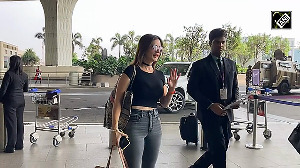Four Indian-American teenagers have been named as 2006's fellows of non-profit organisation Davidson Institute for Talent Development, an honour for "prodigiously gifted" students under the age of 18 years.
The Davidson Fellows -- Shivani Sud, Sheela Krishnan, Varun Kumar and Anarghya Vardhana -- have also won scholarships ranging from $10,000 to 50,000 for their projects in the fields of science, medicine and mathematics.
They will be recognised in Washington on September 27 along with 16 other fellows from across the country.
"The Davidson fellows are success stories because they've nurtured their genius by seeking out mentors, relying on strong family support and working diligently to achieve their goals," said Bob Davidson, the co-founder of the Reno-based institute, which was established in 1999 to support profoundly gifted students.
Shivani, 16, of Durham, has won $50,000 scholarship for her project in science. She developed a technology to deliver chemotherapeutic molecules to cancerous cells with increased efficiency.
Her findings can assist with more efficient drug delivery by overcoming cell membrane barriers, one of the greatest challenges facing conventional chemotherapy.
Through protein transduction, Shivani developed a drug delivery system focused on an amino acid region of the HIV-1 Tat protein that allows larger medicinal molecules to pass into the cell.
Particularly relevant to controlling tumours in areas where surgery is not an option, this research can help combat cancer and infectious diseases through more effective chemotherapy treatments.
Sheela Krishnan, 17, of New York won $25,000 for her project in which she analysed Paenibacillus larvae, the bacterium that causes American Foulbrood Disease, a fatal disease that attacks honeybee larvae.
Sheela used the antimicrobial properties from the bees' honeystomachs to create a safe, non-invasive and inexpensive preventative measure to protect honeybees from AFB.
Varun Kumar, 17, of Texas won $25,000 for his project in which he determined how to improve diagnostics in the field of medicine through more effective magnetic resonance imaging.
Varun researched and built compounds that could be used to form a new class of MRI contrast agents, responsive to proteins instead of water concentration.
By showing the distribution of proteins throughout a living system, these new agents could add a powerful dimension to MRI.
Anarghya Vardhana, 17, of Beaverton won $10,000 in mathematics. She worked in the field of number theory to develop new starting values for the Lucas-Lehmer primality test. Her theorem can be used to further understand Mersenne primes and their properties through simple and efficient computation of Jacobi symbols.
By allowing for easy computation, Anarghya's method can directly contribute to pharmaceutical, chemical, materials, financial and information technology industries. Her theory also has broad implications in cryptography.






 © 2025
© 2025